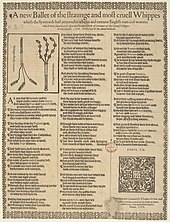Thomas Deloney
His subject matter, like that of most Elizabethan and Jacobean balladists, was wide-ranging and eclectic, including stories from English history and romance, religious and moral exhortations, social and political commentary, and journalistic reporting of current events.
[10] And in 1596 a ballad on the scarcity of grain in London was criticized as "scurrilous" and "vain and presumptuous" by the mayor of the city, Stephen Slaney, in part because in it Deloney had the queen engage in a dialogue with her people "in a very fond and undecent sort", which might incite discontent among the poor.
Four novels — Jack of Newbury, the two parts of The Gentle Craft, and Thomas of Reading — were published in the last three or four years of his life (1597–1600), and it is on these works that his modern reputation chiefly depends.
[13] Deloney's novels are a mixture of historical romance and social and economic realism, which draw heavily in their choice of subject matter, background, and incidental details on his personal experience as a member of the commercial class of artisans and merchants in Elizabethan London.
[20] He makes much greater use of dialogue than other contemporary writers of prose narratives, such as Robert Greene and Thomas Nashe, and shares some dramatic techniques with the Elizabethan playwrights.

